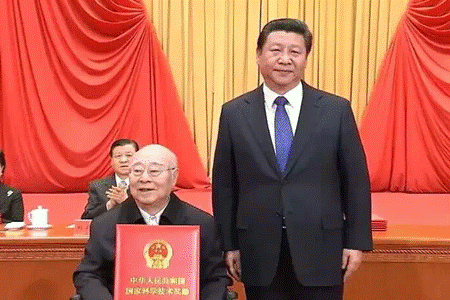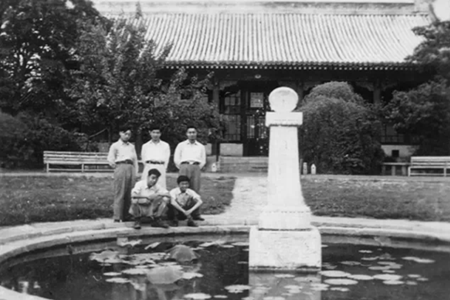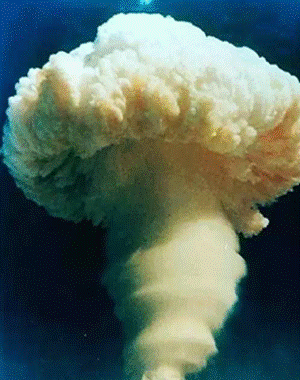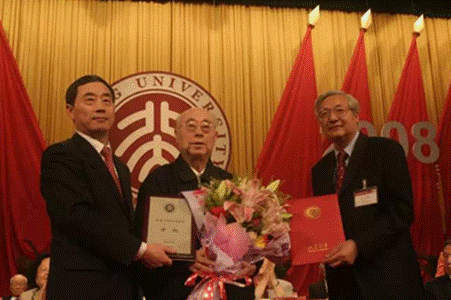Peking University, Jan. 16, 2015: On January 9, the award ceremony for 2014 National Top Science and Technology Award was held in Beijing. Yu Min, member of Chinese Academy of Sciences, China’s accomplished nuclear physicist, prominent leader in the program of China’s nuclear weapons and high technology for national defense, outstanding alumnus of Peking University, was granted with the National Top Science and Technology Award of 2014 by President Xi Jinping. Yu is the only winner of the award in 2014.

President Xi Presents Award to Yu
“A man will perish sooner or later. If my slight efforts could contribute to the prosperity of my country, I have nothing to regret. ”
---Yu Min
Yu Min was born in 1926 in Tianjin, a city bordering Beijing on the east. In 1946, Yu Min went to Peking University to study physics where he was acknowledged as “the top student PKU has ever seen in many years” by faculties. He graduated from the Department of Physics in 1949 and continued his graduate study there. In 1980 he was elected as a member of Chinese Academy of Sciences, the highest academic institution in China for comprehensive research in natural sciences and high technology.

Yu (the rear left) and His Classmates at PKU
Yu’s main scientific achievements include that he tackled a series of fundamental problems achieving breakthroughs in hydrogen bomb theories. He came up with a complete set of ideas from theories to configurations, thus playing a critical role in the research of hydrogen bomb. He later led the theoretical research and design of nuclear weapons, solved lots of theoretical problems and made great contributions to developing China’s nuclear weapons to an international level.
Every One Has a Share of Responsibility for His Country
Yu Min in his early years experienced both China’s Warlord Period (1912-1937) and the Anti-Japanese War (1937-1945). Living in the occupied Tianjin and Beijing, he witnessed the Japanese invaders’ brutal acts: robbing, looting and killing innocent civilians. He was indignant and determined to use science to protect his motherland from such suffering and humiliation. Such sense of responsibility for China later became the solid spiritual foundation of his lifetime devotion to the research of national defense technology. “I was quite young when China was invaded. The war left me miserable and humiliating memories. China never repressed other nations, and refused to be repressed. In this sense, nuclear weapons would serve for self-protection. Patriotism was the fundamental motivation for my research in nuclear physics.”
Father of China’s Hydrogen Bomb
In 1960, a group of young scientists under the leadership of Yu Min secretly began the theoretical research of hydrogen bomb technology. At that time, Yu was already a famous scientist in basic research with considerable achievements. Transferring to the research of hydrogen bomb meant that he had to live a rigid, arduous and obscure life instead of his original promising career due to the high confidentiality of the hydrogen bomb research. Yu didn’t hesitate when confronting the dilemma. He therefore vanished from the public media for almost 40 years until 1988 when he finally retired from his post. But even today, few reports can be found about him on media.

Test Explosion of China’s First Hydrogen Bomb in June, 1967
Yu led his team to work around the clock despite the extreme conditions of hostile international circumstances and extreme shortage of qualified scientists and financial support at home. During the four years of research, scientists and engineers under the guidance of Yu came up with 69 research reports with the help of only one electronic computer 95% of whose time was allocated to the nuclear bomb research. Unknown fields were uncovered one by one, a crucial stage for the deep understanding of many basic phenomena and regular patterns of hydrogen bomb.
Yu’s talent, hard work and leadership alongside other scientists’ perseverance led to the successful test explosion of China’s first hydrogen bomb in June, 1967, causing a sensation among major world powers and further protecting China from their nuclear deterrence. Yu was undoubtedly the father of China’s first hydrogen bomb.
Spared from Death Three Times
In developing the hydrogen bomb, Yu had three close encounters with death. In early 1969, frequent travel from Beijing to southwest China along with spiritual burden and heavy workload worsened his existing troubled stomach. One day he went into shock when working in the laboratory and was rescued timely by his colleagues. But after his recovery, Yu soon joined his team again and didn’t reduce his workload. In October, 1971, Yu went into shock again in midnight and, luckily, his wife happened to be around that night and rushed him to the hospital. Things would have been totally different if his wife hadn’t been allowed to return from South-west China to take care of him. In 1973, Yu lost his consciousness during an infusion in the emergency room, but once again he survived. People who knew him said that he was blessed, for no one could be spared from death three times.

Yu Was Awarded Outstanding Alumnus in 2008, PKU’s 110 Anniversary
Written by: Xiao Chunliang
Edited by: Yan Shengnan
Source: School of Physics, Peking University (http://pkunews.pku.edu.cn/xwzh/2015-01/15/content_287152.htm)